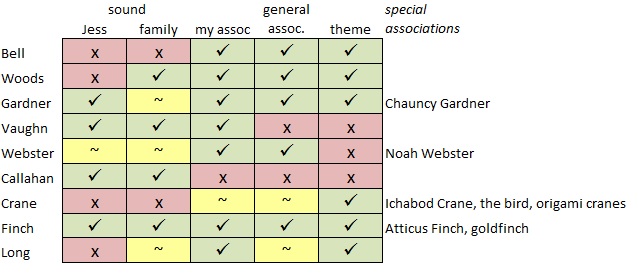
In my current novel, my character names have been a mess. I’ve used up hours naming and renaming major characters, with the protagonist so far the most name-changed individual with two rounds of selection for her first name and three for her last name. Not only do I want each name to be right, I also want them to fit together, and to minimize the possibility of them being confused with each other. For instance, I generally try to avoid giving any two major characters of the same gender the first initial.
Naming characters well
Character names are important to me for a number of reasons. An awkward name makes it harder for me to read a story. A name with the wrong “feel” or associations is offputting. A name that I don’t like makes it hard for me to like the character. The wrong name in a story, especially in my own story, yanks me out of the experience and into a critical, peevish attitude that gets in the way of experiencing the story.
Some writers have nailed this. Shakespeare, for my money, was as poetic with his names as with everything else he wrote. Dickens was a master of names, too. J. K. Rowling has some of the cleverest names I’ve ever heard, given that she’s writing for a young audience. That she would have a wizard character with the intriguing but cheerful name “Tom Marvolo Riddle,” and that this would be an anagram for “I am Lord Voldemort,” with “Voldemort” not only having an ominous and terrible sound a la Sauron or Tash or (more subtly) Moriarty, but also having the meaning (if we apply German and French) of “full of death” … that’s just insane. I can’t imagine how she managed that.
Name resources
Let’s not set the bar too high, though. In terms of finding good, appropriate names for characters, first of all, here are a few of my favorite resources:
- The most common 1,000 U.S. surnames
- First names for boys and girls by nationality: 20,000 Names. Contains ads. There are a number of other baby naming sites like this.
- Most popular baby names for boys and girls by state, decade, year, etc. from U.S. Census
Scrivener (see “How Tools and Environment Make Work into Play, Part I: The Example of Scrivener” and “Would Scrivener Make You a Happier Writer?“) has a name generation feature which is very convenient, but I have often found these names to be too random and uncommon for my taste. However, it will let you choose nationalities and other factors, so for some Scrivener users, it might be just the thing.
Choosing a name: an example
Here’s a grid I used to choose a new surname for the protagonist of my current novel. I had five criteria:
- How the name sounded (to me) with the protagonist’s first name
- How it sounded with her family members’ first names
- How the name “felt” to me in terms of suiting this character (and to a much lesser extent, her family)
- Associations I thought readers might commonly have with the name, and
- Thematic resonance/appropriateness.
I got my list of candidates by browsing through that “1,000 most common surnames” link and choosing anything that looked like it might suit.
Check marks mean “win,” x’s mean “fail,” and tildes (~) mean “meh, sorta.”

In the end, I went with “Finch,” not only because it was the one choice to score all five check marks, but also because of the nuances of the the specific associations with advocacy, right action, long odds, great literature, and nature. What this gives me is a character name I feel good about and that works with me rather than against me. It doesn’t matter that I stole it: as Pablo Picasso once said, “Good artists copy, great artists steal.” Whether you steal your name or come by it honestly, here’s wishing you characters that sound like the people you want them to be.
Drawing by Irrisor-Immortalis.



